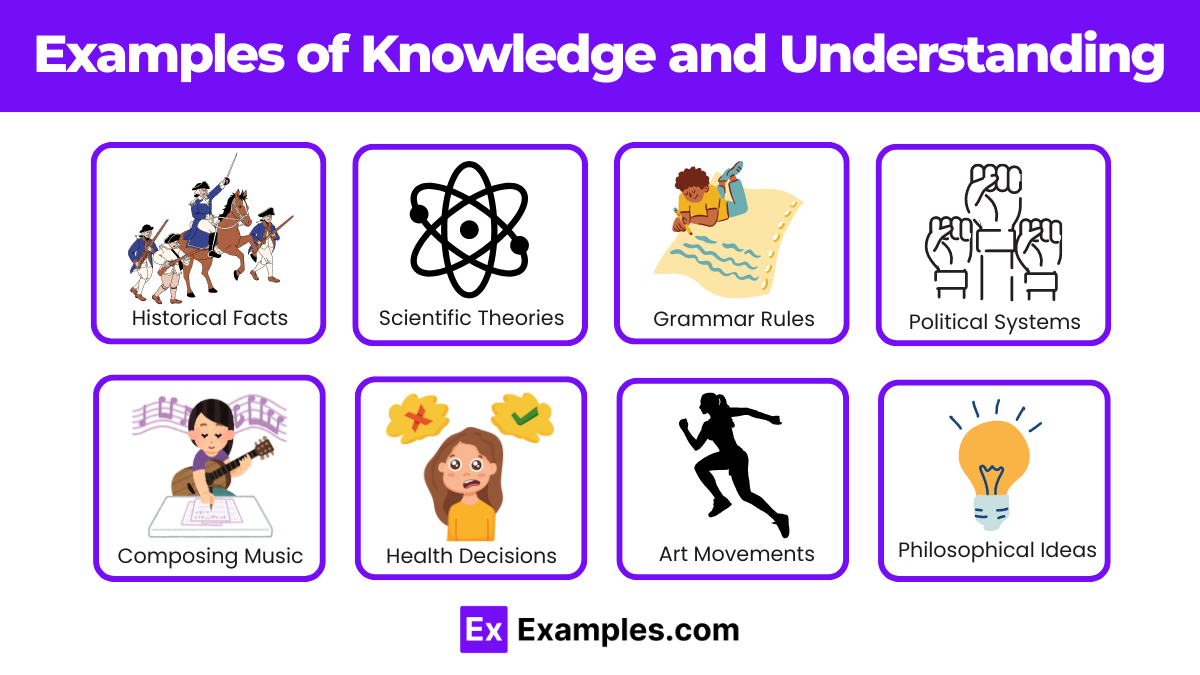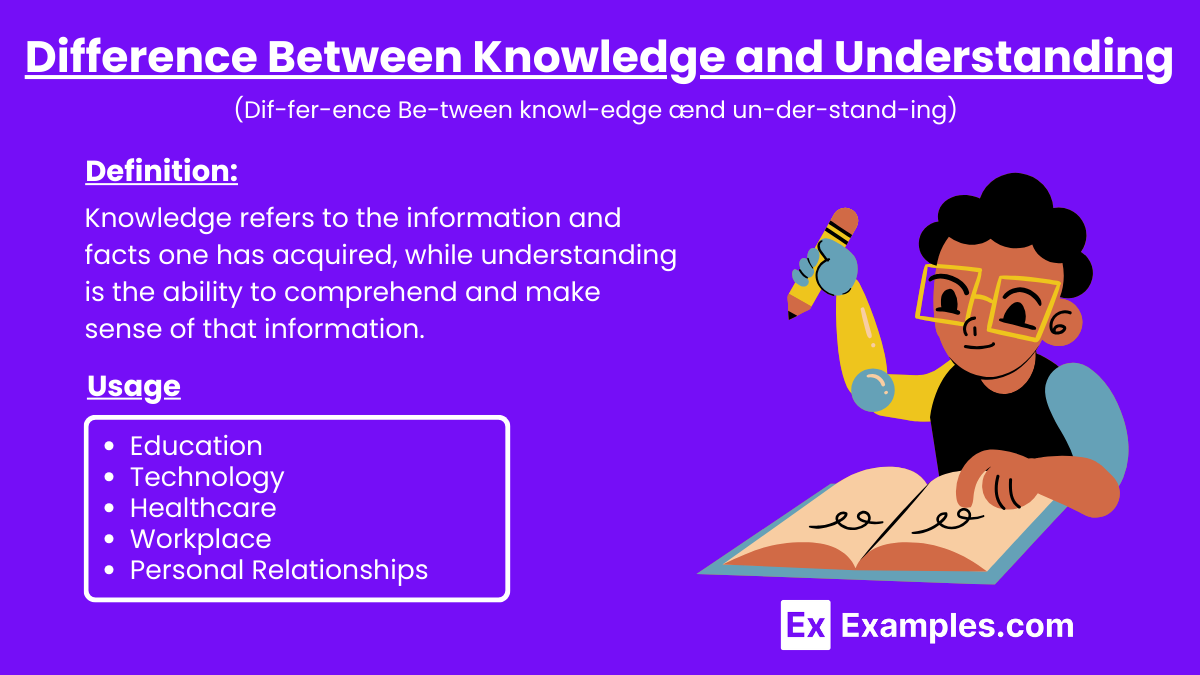Difference Between Knowledge and Understanding – 39+ Examples, Differences, Usage, Importance
The difference between knowledge and understanding lies in their depth and application. Knowledge refers to the information and facts acquired through education, experience, or research. It encompasses general knowledge and specific details across various subjects. Understanding, on the other hand, is the ability to interpret and make sense of this information, often requiring deeper cognitive processing and reflection. In philosophy, this distinction is crucial as it influences how individuals perceive and engage with the world around them.
What are Difference Between Knowledge and Understanding?
Knowledge is the acquisition of information and facts through education, experience, or research.Understanding is the ability to interpret, comprehend, and apply that information in various contexts.
Examples of Knowledge

- Historical Facts: Knowing that the American Revolution began in 1775.
- Scientific Theories: Understanding the theory of evolution.
- Mathematical Formulas: Knowing the Pythagorean theorem.
- Literary Works: Familiarity with Shakespeare’s plays.
- Geographical Information: Knowing the capital of France is Paris.
- Grammar Rules: Understanding subject-verb agreement.
- Technological Terms: Knowing what HTML stands for.
- Health Information: Understanding the benefits of a balanced diet.
- Art Movements: Recognizing the characteristics of Impressionism.
- Political Systems: Knowing the structure of the U.S. government.
- Language Skills: Being fluent in Spanish.
- Music Theory: Understanding how to read sheet music.
- Economic Principles: Knowing the concept of supply and demand.
- Religious Beliefs: Familiarity with the Five Pillars of Islam.
- Chemical Elements: Knowing that water is composed of hydrogen and oxygen.
- Sports Rules: Understanding the rules of soccer.
- Biological Concepts: Knowing the process of photosynthesis.
- Cultural Practices: Understanding traditional Japanese tea ceremonies.
- Legal Terms: Familiarity with the concept of habeas corpus.
- Philosophical Ideas: Knowing Plato’s theory of forms.
Examples of Understanding
- Analyzing Historical Events: Comprehending the causes and effects of the American Revolution.
- Applying Scientific Theories: Using the theory of evolution to explain biodiversity.
- Solving Mathematical Problems: Applying the Pythagorean theorem to calculate distances.
- Interpreting Literary Works: Understanding the themes and motifs in Shakespeare’s plays.
- Using Geographical Knowledge: Explaining the cultural significance of Paris as a global city.
- Applying Grammar Rules: Correctly using subject-verb agreement in sentences.
- Using Technological Skills: Creating a website using HTML and CSS.
- Making Health Decisions: Choosing a balanced diet based on nutritional knowledge.
- Appreciating Art Movements: Identifying and appreciating Impressionist art.
- Analyzing Political Systems: Understanding how the structure of the U.S. government affects policy-making.
- Communicating in Another Language: Holding a conversation in Spanish with native speakers.
- Composing Music: Creating a melody based on music theory.
- Applying Economic Principles: Explaining market fluctuations using supply and demand concepts.
- Practicing Religious Beliefs: Understanding the significance of the Five Pillars of Islam in daily life.
- Conducting Experiments: Using knowledge of chemical elements to create safe chemical reactions.
- Playing Sports: Understanding soccer strategies and tactics.
- Explaining Biological Processes: Describing how photosynthesis sustains plant life and impacts ecosystems.
- Participating in Cultural Practices: Performing a traditional Japanese tea ceremony with proper etiquette.
- Using Legal Knowledge: Applying the concept of habeas corpus in legal contexts.
- Discussing Philosophical Ideas: Engaging in a debate on Plato’s theory of forms and its implications.
What is the Difference Between Knowledge and Understanding
| Aspect | Knowledge | Understanding |
|---|---|---|
| Definition | Information and facts acquired through education, experience, or research. | Ability to interpret, comprehend, and apply information in various contexts. |
| Depth | Surface-level awareness of details and facts. | Deeper cognitive processing and reflection. |
| Application | Memorizing and recalling information. | Making sense of and utilizing information effectively. |
| Examples | Knowing historical dates, scientific facts, or grammatical rules. | Explaining historical significance, applying scientific theories, or using grammar correctly. |
| Relation to Experience | Can be gained without direct personal experience. | Often requires personal experience and contextualization. |
| Cognitive Process | Involves storage and retrieval of information. | Involves analysis, synthesis, and application of knowledge. |
| Outcome | Possession of facts and data. | Ability to solve problems and make informed decisions. |
| In Education | Emphasized in tests and quizzes to assess memorization. | Emphasized in projects and discussions to assess comprehension. |
| Philosophical Perspective | Seen as the accumulation of data. | Viewed as the internalization and meaningful use of data. |
| Examples in Daily Life | Knowing the recipe for a dish. | Being able to cook the dish successfully and modify the recipe as needed. |
Usage of Knowledge
1. Education
Teaching and Learning: In education, knowledge is used to teach and inspire students, facilitating their intellectual growth and development.
2. Technology
Development: Knowledge in science and technology drives the development of new technologies and advancements.
3. Healthcare
Medical Research: Knowledge is crucial in medical research Gap for discovering new treatments and cures.
Usage of Understanding
1. Education
Deep Learning: Understanding promotes deeper learning, where students grasp the underlying concepts rather than just memorizing facts.
2. Workplace
Team Collaboration: Understanding improves teamwork by fostering effective communication and collaboration.
3. Personal Relationships
Conflict Resolution: Understanding helps resolve conflicts by addressing the underlying issues and emotions involved.
Importance of Knowledge
1. Decision-Making
Informed Choices: Knowledge helps individuals make informed choices by understanding the potential outcomes and implications of their actions.
2. Personal Development
Continuous Learning: The use of knowledge encourages lifelong learning and personal growth.
3. Professional Advancement
Career Growth: Knowledge is essential for career advancement, enabling individuals to stay updated with industry trends and best practices.
Importance of Understanding
1. Clarity and Precision
Effective Messaging: Understanding ensures that messages are clear and accurately conveyed, reducing the chances of miscommunication.
2. Empathy and Connection
Building Relationships: Understanding others’ perspectives and emotions fosters empathy, leading to stronger interpersonal relationships.
How do knowledge and understanding impact recommendations in research?
Knowledge informs the data collected, while understanding shapes how recommendations in research are developed and applied without bias.
Can you have understanding without knowledge?
No, understanding requires a foundation of knowledge to interpret and apply information effectively in various rhetorical contexts.
Why is understanding important in a rhetorical context?
Understanding allows individuals to apply knowledge appropriately in a rhetorical context, ensuring effective communication and reduced bias.
How does bias affect knowledge and understanding?
Bias can distort knowledge and hinder true understanding, impacting the validity of research recommendations and their application in different rhetorical contexts.
How can one improve their understanding beyond mere knowledge?
Engage in critical thinking and apply knowledge in various rhetorical contexts to deepen understanding and minimize bias.
What role does understanding play in research recommendations?
Understanding ensures that research recommendations are well-grounded and applicable, avoiding the pitfalls of bias.
How are knowledge and understanding evaluated differently in a rhetorical context?
Knowledge is assessed by factual recall, while understanding is evaluated by the ability to apply knowledge appropriately in a rhetorical context.
Why is it important to distinguish between knowledge and understanding in research?
Differentiating between the two helps in crafting unbiased, effective research recommendations and applying them correctly in varied rhetorical contexts.
How does bias influence the transition from knowledge to understanding?
Bias can impede the objective interpretation of knowledge, leading to flawed understanding and ineffective recommendations in a rhetorical context.
Can you rely on knowledge alone for research recommendations?
Solely relying on knowledge may result in recommendations influenced by bias; understanding is crucial for contextually accurate application.



